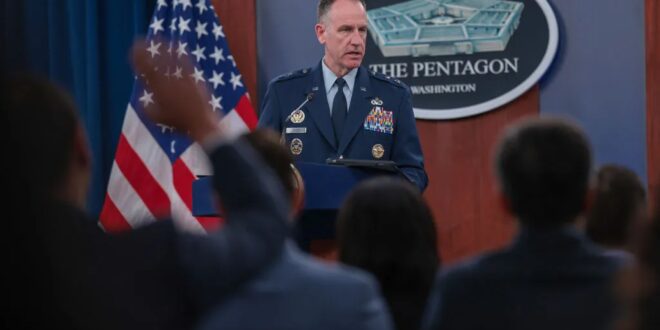Ever since a 2,000-pound bomb demolished Hezbollah’s headquarters in Southern Beirut last Friday and killed Hassan Nasrallah, the leader of the organization since 1992, there was an expectation among the commentariat that Iran would retaliate. The scope of that response, however, was very much in dispute. The Iranian government was reportedly divided about whether to respond at all, with the newly-elected president, Masoud Pezeshkian, taking the position that an attack against Israel would likely ruin his foreign policy agenda — he offered the West the thinnest of olive branches during his time in New York for the UN General Assembly meetings — and give the Israeli government an excuse to strike inside Iranian borders.
Supreme Leader Ayatollah Ali Khamenei, however, seems to have concluded that sitting on his hands and letting Israel’s ferocious assault on Hezbollah continue without lifting a finger wasn’t an option. This isn’t exactly surprising — Hezbollah is Iran’s crown jewel in a network of anti-Israel militias designed to keep the pressure on Israel and bolster Iranian deterrence in the Middle East. Tehran has relied on Hezbollah to bail out Syrian president Bashar al-Assad from defeat during Syria’s civil war, train allied militias like the Houthis as it fought off a Saudi-backed air campaign in Yemen and support Hamas by sustaining near-daily rocket launches into northern Israel. The string of assassinations within Hezbollah’s command structure over the last two weeks hasn’t eliminated Iran’s favorite non-state partner in the region but has certainly degraded it.
Sure enough, Iran’s response occurred days after Nasrallah was killed (a senior Iranian commander was also killed in the bombing). According to US National Security adviser Jake Sullivan, nearly 200 Iranian ballistic missiles rained down on Israel in the dead of night. Israel’s air defense system put up a hell of a fight but couldn’t shoot down every single projectile. Amateur videos showed some of the missiles hitting Israeli soil. Tel Aviv and Jerusalem were both targeted in the salvo. Miraculously, at the time of writing, the Israel Defense Forces (IDF) haven’t registered a single casualty, demonstrating the country’s exceptional preparatory measures. When the attack was over, Iran’s mission at the United Nations warned Israel to stand down and that if it didn’t, a “crushing response will ensue.”
If Tehran is hoping this threat will deter Israel from retaliation, it will likely be disappointed. After the Iranians sent drones and missiles into Israel last April, Israel used military force about two weeks later to hit back. That strike, against several targets in a single Iranian air base near the city of Isfahan, was extremely limited and no doubt designed to end the tit-for-tat before it got out of control. The Israeli airstrike inside Iran was so insignificant in Tehran’s eyes that it was barely worth addressing. The drama fortunately had an anti-climactic ending.
Even so, it’s exceedingly difficult to believe Israel will hold its fire this time. If the Israelis retaliated for the April attack, one must assume the Israelis will retaliate for this attack as well. You can bet the Iranians are working off that assumption; reports suggest that Iran has already closed its airspace diverted all civilian flights. Khamenei, mindful of what happened to his buddy Nasrallah, is in a secure location. The IDF is talking about revenge, with the military’s chief spokesman stressing, “We will act at the time and place of our choosing.” It’s likely not a matter of if retaliation will happen but rather when.
For the United States, this entire situation is a bit dicey. There are more than 40,000 US troops stationed in the region, and many of those bases — particularly in Iraq and Syria — are easy pickings for Iranian-backed militia groups who could presumably join the fray if Israeli bombs begin falling on Iranian soil. Defense secretary Lloyd Austin has sent thousands of additional personnel, increased the number of US fighter aircraft in the region, cancelled a planned withdrawal of the USS Abraham Lincoln carrier strike group and put more air defense systems in place as a precautionary measure. The enhanced force presence is meant to dissuade Iran from attacking US interests, but could also have the counterproductive effect of convincing Israel to escalate more than it otherwise would — the exact opposite of what US officials want to see.
President Biden will get on the phone with Israeli prime minister Benjamin Netanyahu to counsel restraint, just as he did after Iran’s first missile attack in April. Ideally the Israelis wouldn’t respond at all; as difficult as this would be for Netanyahu to swallow politically, it’s the quickest way of putting this saga to an end. Yet Biden understands that this probably isn’t a scenario Netanyahu will consider. Instead, he will try to sell him on as limited and precise an operation inside Iran as possible. Given the Israeli premier’s penchant for taking risks and habitual ignoring of Biden’s reservations, nobody can say with certainty whether Netanyahu will seriously listen.
The US is caught in a world of contradictions. It wants Israel to de-escalate but backs Israel up when it chooses to escalate. It aims for a diplomatic resolution to the war between Israel and Hezbollah but quickly accedes to an Israeli ground operation in Southern Lebanon. It hopes to avoid a war with Iran even if as its strategy, which includes deploying more US military forces to the region, undermines that objective. And it’s praying for Netanyahu to respond proportionally even as Netanyahu grows exceedingly confident that his superpower partner will back him up come hell or highwater.
 Eurasia Press & News
Eurasia Press & News




